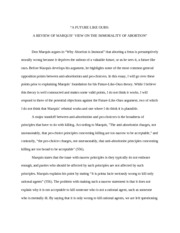Abortion is a controversial and highly debated topic that has been at the forefront of public discourse for decades. In 1989, philosopher Don Marquis published an influential essay titled "Why Abortion is Immoral," in which he argued that abortion is morally wrong because it deprives the fetus of a valuable future. This essay will summarize Marquis's argument and evaluate its strengths and weaknesses.
Marquis begins his argument by stating that the moral wrongness of abortion lies not in the act of killing itself, but in the loss of a valuable future that the fetus would have had if it had been allowed to develop into a full-fledged person. He argues that all animals, including human beings, have a valuable future, and that this future consists of the various experiences, projects, and activities that make life worth living. When an animal's life is taken prematurely, this valuable future is lost, and this loss is what makes the act of killing wrong.
Marquis then goes on to argue that a fetus has a valuable future just like any other animal, and that this future is lost when the fetus is aborted. He points out that a fetus is a developing human being, with the potential to grow into a fully functioning adult with a rich and fulfilling life. When a fetus is terminated, this potential is never realized, and the valuable future that the fetus could have had is lost forever.
Marquis's argument has been highly influential and has been widely discussed and debated by philosophers and ethicists. One of the strengths of his argument is that it avoids the controversial question of when human life begins, and instead focuses on the value of a future that is lost when an animal's life is taken prematurely. This avoids the problem of trying to determine when a fetus becomes a person, which is a difficult and contentious issue.
However, Marquis's argument has also been criticized on several grounds. One of the main criticisms is that it relies on the assumption that all animals, including fetuses, have a valuable future that is lost when their lives are taken prematurely. Some philosophers have argued that this assumption is problematic, as it is not clear that all animals have a valuable future in the same way that human beings do. For example, it is not clear that a fetus has the same capacity for experiencing pleasure and pain, or for engaging in the same kinds of projects and activities, as a fully developed adult.
Another criticism of Marquis's argument is that it does not adequately address the issue of a woman's right to control her own body. Many proponents of abortion argue that a woman has the right to decide what happens to her own body, and that this right overrides any potential value that a fetus might have. Marquis's argument does not address this issue directly, and it is not clear how it could be reconciled with the idea that a woman has the right to control her own body.
In conclusion, Don Marquis's argument that abortion is wrong because it deprives the fetus of a valuable future is a significant contribution to the debate over abortion. While it has been influential and has helped to clarify some of the moral issues involved in abortion, it has also been criticized for its assumptions about the value of a fetus's future and its lack of consideration of a woman's right to control her own body. Ultimately, the question of whether abortion is morally wrong or not remains a complex and controversial issue that is unlikely to be resolved anytime soon.




